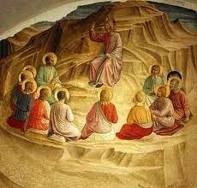
In the readings for last week’s Sunday Mass, we saw Jesus as the fulfillment of Isaiah’s prophecy (Isaiah 9) that a divine king, a Son of David, would appear in the north of Israel and give light to the people there.
In the readings for todays’ Mass (4th Sunday of Ordinary Time), we see Jesus explaining what kind of kingdom he rules: a kingdom of the “poor in Spirit”:
When Jesus saw the crowds, he went up the mountain,
and after he had sat down, his disciples came to him.
He began to teach them, saying:
“Blessed are the poor in spirit, for theirs is the kingdom of heaven.
Blessed are they who mourn, for they will be comforted.
Blessed are the meek, for they will inherit the land.
Blessed are they who hunger and thirst for righteousness,
for they will be satisfied.
Blessed are the merciful, for they will be shown mercy.
Blessed are the clean of heart, for they will see God.
Blessed are the peacemakers, for they will be called children of God.
Blessed are they who are persecuted for the sake of righteousness,
for theirs is the kingdom of heaven.
Blessed are you when they insult you and persecute you
and utter every kind of evil against you falsely because of me.
Rejoice and be glad, for your reward will be great in heaven.”
The connections with the First Reading (Zep 2:3; 3:12-13), the Psalm (Ps 146:6-7, 8-9, 9-10) and Second Reading (1 Cor 1:26-31) are very obvious. Zephaniah prophesied some future day when a poor and humble remnant of God’s people shall gather under the protection of the Name of the LORD (a rich concept in the OT). The Psalm praises the LORD for his solicitude for the downtrodden, and St. Paul points out to the Corinthian Christians that the large majority of them come from the low end of the socio-economic totem pole—and that actually fits the way God typically works in history.
As a convert to Catholicism, it strikes me that this Gospel reading (the Beatitudes) is probably one of the key passages that Catholics would think of as a summary of the Gospel. Reformational Protestants (traditional Lutherans and Calvinists), however, would never think of the Beatitudes as a summary of the Good News: they would go instead to Ephesians 2:8-9, Romans 6:23, or similar passages on the theme of “salvation by faith not works.”
This calls to mind the discussion on Grace and Merit in the posts below from earlier this week.
Actually, properly understood, both the Beatitudes (Matt 5:1-11) and passages like Eph 2:8-9 are teaching the same Good News.
There is a theology of Grace and Merit present in the Beatitudes themselves, with which St. Paul’s teaching agrees.
The person who lives by the Beatitudes is “poor in spirit,” which may be taken to mean, “recognizes his spiritual poverty, namely, that there is nothing of spiritual worth in himself alone, apart from God’s grace.” The person who is “poor in spirit” does not depend on himself or his own merit, but recognizes that anything within himself of any value in a spiritual sense has been given to him by God.
At the same time, the spiritually poor person does not presume on God’s grace, and continue a life of sin, which is to say, a life of self-centeredness and self-indulgence.
On the contrary, the spiritual poor cultivate meekness, purity of heart, and sorrow for sin. They show mercy, make peace, and experience persecution. These actions and qualities have merit in God’s eyes, but they are the result not of the poor person’s great spiritual resources. Rather, they come from his continued dependence on God’s grace.